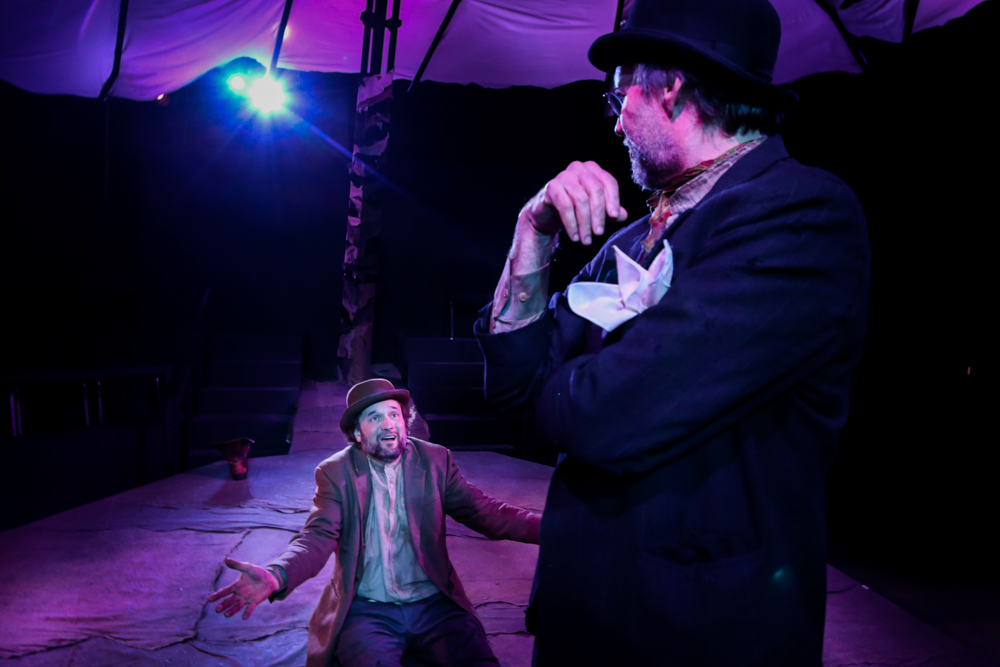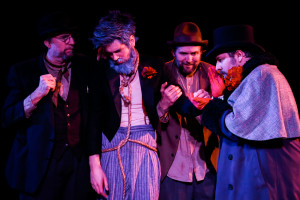
In Curio Theater Company’s production of Samuel Beckett’s masterpiece (directed by Dan Hodge), the audience completely surrounds a tiny barren stage. The only set piece is a giant dystopian metal tree. It extends to a tattered canopy which filters the undefinable light into a soft gloaming. Set designer Paul Kuhn and lighting designer Tim Martin have created a bubble of no time, no place, in which anything or nothing can happen.
Vladimir and Estragon (Brian McCann and the very same Paul Kuhn) are the ultimate codependent odd couple. “Didi” is a lofty thinker, with some idea of manners, and some form of memory, where “Gogo” is more down to earth, sometimes literally. Much of his time is on the ground: sulking, sleeping, or fussing with his boots. In spite of their differences, there is much love between them, platonic or perhaps sexual. Both McCann and Kuhn play their parts with natural affection for each other and excellent timing. Their banter is Abbot & Costello, and their clowning (confusing hats, falling pants) Laurel & Hardy. Because of the circular seating and the staging, we are often able to see only one of their faces. This is sometimes a disappointment, but both are so funny in their own way, it’s almost as fun to imagine what the other is doing.
Their dialectical and physical repartee are both enhanced and disturbed by the appearance of Pozzo (Robert DaPonte) and his unfortunate slave, Lucky (Harry Slack). DaPonte struts about the stage, relishing the flip of his coattails and the twitch of his whip, attached like a demon’s tale to his back (designed by Aetna Gallagher). His tenuous bravado cracks easily open into self doubt, but it’s delivered with a wink as well, making it impossible to know where he stands or how much he knows.
Lucky is broken, or at least, very bent. He droops painfully under the weight of Pozzo’s bags for most of their scene. Slack’s ability to maintain this pose is challenge enough, but when he is ordered to think, the actor mumbles a hilarious, preambulatory “On the other hand, in regards to”, before launching into a whirlwind of academic nonsense: the highlight of act one. While Slack doesn’t have the builds and pauses that make the speech more satire than nonsense, the cast brings the energy of inanity.

All the characters tornado into mayhem at his discourse, circling, using the round of the stage to its greatest effect. An uncomfortable squeal emerges, a reminder that the whole situation is hilarious and hellish. Lucky is stopped and he and his master leave. We are left with the quieter pair who try to fill the space and time with more talk of life and Christ and nonsense. The pale moon rises and a boy informs the pair that Godot is not coming that night. They must wait til tomorrow.
The second act is much the same as the first, Vladimir remembering everything, Estragon nothing. A sadder and stranger Pozzo and Lucky return. The foursome again is the height of energy, leaving Didi and Gogo to carry us to the end. They casually talk of suicide but when they try with Gogo’s belt, it breaks and Gogo’s pants fall down. The energy wanes towards the end, perhaps intentionally. Godot doesn’t come. They must wait. Nothing happens.
Beckett hated the idea they were waiting for god, but agreed it could be anything. It’s just life and we fill it with what we can: waiting, boredom, thinking, dancing, insults, outside threats, interesting characters. It does pass the time.
[Curio Theater at the Calvary Center for Culture and Community, 4740 Baltimore Ave]. February 8-March 4, 2017; curiotheatre.org.
